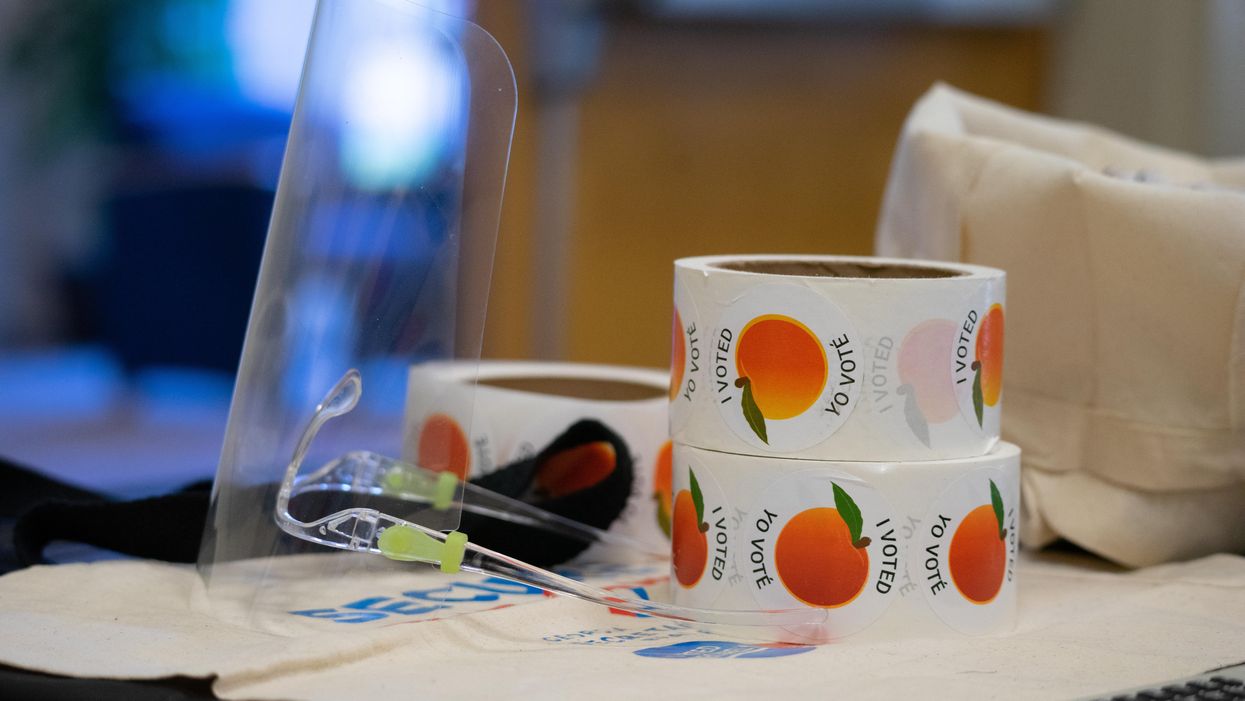Even during the most expensive, contentious and turbulent election cycle in American history, democracy still prevailed — even in long-controversial Georgia, where the spending, campaigning and rhetoric continued into early January.
Voters came out in record numbers despite the raging Covid-19 pandemic and the election's integrity withstood repeated attacks from President Trump and his loyalists, including Wednesday's violent invasion of the Capitol while Congress certified the Electoral College count and Joe Biden's victory.
Georgia, with a history of voter suppression, was home to one of Trump's most flagrant attempts to undermine the election. Just days before the in-person voting, the president pressured Secretary of State Brad Raffensperger to "find" 11,780 votes — one more than Biden's winning margin in the state. Despite such efforts to subvert the results, election security experts say voters should rest assured that elections in the Peach State, like the rest of the country, were conducted with integrity and fairness.
While chaos broke out in Washington, Democrats secured two more wins in Georgia this week as the season's final election contests concluded. Democrats Jon Ossoff and Raphael Warnock defeated their respective GOP incumbents, David Perdue and Kelly Loeffler, in the state's twin runoffs, creating an even split in the Senate — where Vice President-elect Kamala Harris will provide any tie-breaking votes.
Ossoff, a 33-year-old documentary filmmaker, will be the youngest senator since Biden. Warnock, a pastor of Atlanta's historic Ebenezer Baptist Church, will be the state's first Black senator.
"Well, it turns out that telling the voters that the election is rigged is not a great way to turn out your voters," Republican Sen. Mitt Romney of Utah said Wednesday in response to Trump falsely claiming Georgia's election was rigged.
David Levine, elections integrity fellow at the Alliance for Securing Democracy, said he's been "very impressed by how well conducted the elections have been considering the challenges that election officials have faced," such as coronavirus-related public health concerns, civil unrest and threats of foreign interference.
Georgia's primary saw hours-long lines due to machine malfunctions and staffing shortages. But the state was able to bounce back for the general election and Senate runoffs by increasing pay for election workers to help with retention and adding more secure drop boxes for absentee ballots, among other changes.
"What we saw in June really highlighted areas for improvement, and by and large, Georgia election officials really learned from that and adjusted," said Gowri Ramachandran, an election security expert at the Brennan Center, a liberal public policy institute at New York University Law School.
One silver lining to this pandemic-era election was the increased use of mail voting across the country. These paper ballots automatically established a physical record that made the election results easier to verify. An estimated 95 percent of votes cast in the general election had a verifiable paper trail — an improvement from four years ago when 14 states had paperless systems.
Georgia recently switched to a paper-based system in which voters either fill out a paper ballot or vote on a machine that produces a paper trail. The state also provides emergency paper backups of poll books and ballots in the case of machine malfunction or failure.
That paper trail allowed election officials to conduct a risk-limiting audit of the general election, recounting the more than 5 million votes cast to affirm Biden's win in the state. As one of the 12 states to use risk-limiting audits for elections, Georgia was an early adopter of the process, which experts say is a more efficient and statistically accurate way of ensuring the winner is correct.
"The premise of a risk-limiting audit is that you are determining the number of ballots you have to check dynamically based on the margin of victory, which is a lot more efficient for taxpayers, for speed and also if your goal is to figure out the correct winner," said Quinn Raymond, co-founder of VoteShield, an organization that tracks changes in voter data and flags anomalies for election administrators.
Georgia also keeps its voter rolls up to date through its partnership with the Electronic Registration Information Center, a consortium of 30 states that share registration information to improve accuracy. VoteShield analyzed Georgia's voter and absentee ballot data during the 2020 election and didn't find any issues or suspicious activity.
And while elections in the Peach State went fairly smoothly, experts say there is always room for improvement. For example, officials should focus on retaining election workers, who are often underpaid and overworked, and lining up back-up workers in case of emergency to ensure polling sites are well-staffed.
Republican lawmakers in Georgia have recently proposed significant rollbacks to mail voting based on unsubstantiated claims of fraud. Election security experts say extending early in-person voting and maintaining, if not expanding, no-excuse absentee voting will be key for future elections because multiple voting options boost election security and voter convenience.
"Considering the circumstances, I think it really showed that the people who are in charge of making our elections work and administering them were up for the job," Ramachandran said. "Democracy fared very well."




















Trump & Hegseth gave Mark Kelly a huge 2028 gift